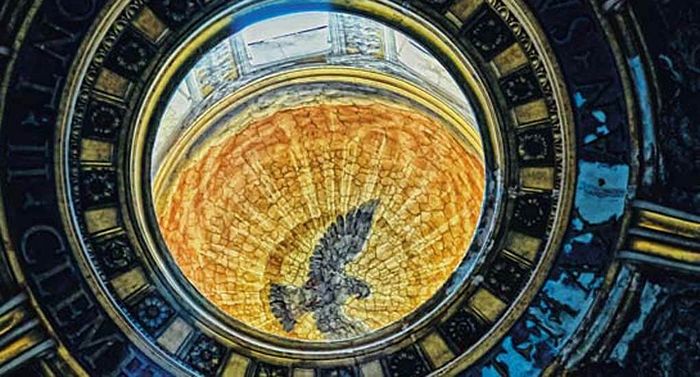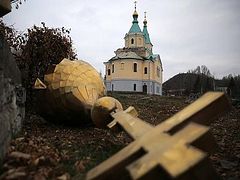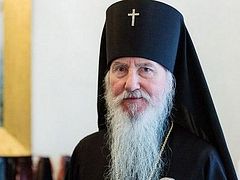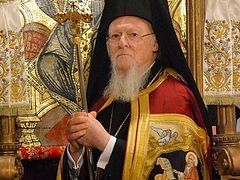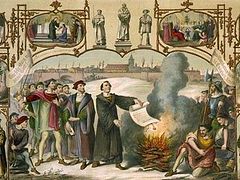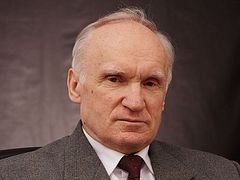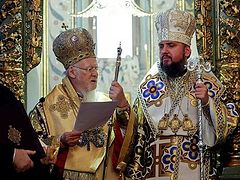A commenter on my last post requested more information surrounding the whole issue of whether Moscow’s break of communion was justified. A number of the churches including the statements released by the bishop’s council in Cyprus have criticized this move.
Number 4. “How much are we risking with regard to the faith when we interrupt Eucharistic communion between our Churches? Is it possible for an ecclesiastical command to cancel the activity of the Holy Spirit in temples where services are performed under the jurisdiction of another Church?”
Number 5. “The interruption of commemoration of a Primate by another Church for any administrative or jurisdictional reason whatsoever, does not bear witness to the Orthodox ethos of humility.” It says that this is a poor example—and the statement brings up prior cases of territorial disputes within the Greek ecumene.
First of all it is canonically and historically clear that interruption of Eucharistic communion and ceasing to commemorate a Patriarch, when done rightly is for the protection of the faith.1 Thus one can equally say, how much are we risking in regard to the faith by not interrupting Eucharistic communion—given gross violations that threaten something essential in our Church life? What is really up for debate then is whether the way in which the MP has broken communion and the reasons for this are within the ethos of the Church. Cyprus has contended that they are not.
Before we can even look at the issue of the reasons and context for Moscow’s actions I think we have to question how the Cypriot Synod has worded their statement. I am not sure why they mention an ecclesial command canceling the activity of the Holy Spirit. Maybe they are imputing to Moscow an understanding that primarily existed within the schismatic Greek churches, which had an inflexible and unrealistic view of sacramental grace? Realistically, whether within a local church or between churches it is not possible for an ecclesial degree or judgment to cancel the activity of the Spirit. Whether this is a problem with careless wording, poor translation, or the Cyrpiot bishops think this is something the Russian hierarchy believe, or whether it is the understanding of the Cypriot bishops themselves, I don’t know. I know of no Russians who are teaching this idea of ecclesial decrees, and in fact this has to be rejected as a false understanding of the ecclesiastical power.
To believe that man has authority to cancel or direct the activity of the Holy Spirit—as if the Spirit is obedient to the will of the bishop, is an understanding of ecclesial power that is implicitly present in the Catholic idea of the bishop as a vicar of Christ, and it is not Orthodox doctrine. If there is a misunderstanding here it may behoove Moscow to put out an additional statement explaining their own view of the operation of ecclesial decrees in addition to the one already put out explaining the reasons for their actions.
In the Catholic doctrine, the bishop as a vicar is an empowered representative of Christ in His absence. In this understanding the activity/energy of the Trinity then becomes something which man brings to bear through his ecclesial rulings. This creates an ecclesial space where the grace and activity of the personal Spirit are related to as if they are an impersonal spiritual energy or activity a “Force” being directed by men. It is a pagan idea and a complete distortion of the sacramental activity and authority in the Church. If this is being put out by some theologian it needs to be condemned. The bishop’s word does not determine the activity of the Spirit. Lord have mercy—shall God submit to a man? Lawlessness indeed. The sacramental activity of the Church is understood as a joint activity of man and God. Concerning this activity, the Scripture tells us, “The wind (pnuema-spirit) blows where it wishes and you hear the sound of it, but do not know where it comes from and where it is going; so is everyone who is born of the Spirit.”2
When the bishops make ecclesial judgments, there is a mystery here. There is a great mystery in how God brings to fruition His will in a fallen world without overturning man’s free will. What we can know is that God has given real authority to the ecclesial word of the bishops; however, the final or absolute word on the matter is always God’s. This is why papal infallibility or any kind of uncompromising stance by a bishop is wrong. There is a fine point of tension where the bishop is required to make a judgment according to his Christian conviction. He cannot simply avoid this through fear of repercussions or public opinion. However, he must always be humbly open to growing into a further revelation of God’s providence through the word of his brother bishops, through the conscience of the faithful, and through circumstances, rather than only listening to his own opinion.
Why is Rome’s doctrine of ecclesial authority so damaging? Not only because it ends in the ridiculous idea of man’s word being able to dictate the activity of grace,3 but also because it sees all grace and activity of the Spirit centered in a head rather than as interpenetrating the whole body. This puffs up the head and atrophies the body and is both unhealthy and unnatural. This idea cuts off the struggle to be open to the revelation of God’s will and the activity of the Spirit as something that shows itself through the whole. It thus cuts off an essential part of the mystery for how God works out His providence in the midst of a fallen world.
If a bishop becomes hardened in his own opinion, this will certainly wound the Church and lead to schism. God’s providence is a mystery that our saints say is discerned by faith and only becomes more clear as one becomes more enlightened through the practice of the Orthodox Spiritual life. It is a hidden activity that is not obvious to those whose minds are still caught up in the material/social/political causes for things. The struggle for all of us is to have faith, have convictions, but equally to hold these lightly and learn to listen to and obey God who is speaking through our brethren. The two extremes to avoid are allowing the unstable opinions of the City of Man to preside rather than being grounded in Christ, or being so hardened in a false zeal and our own “spiritual” opinions that we cannot see the depth and breadth of God’s providence and love as revealed in the differing experience and perception of our brother or various circumstances that God allows.
Within this context, while there is no actual jurisdictional authority between local churches, and so excommunication between churches is not the same as excommunicating someone within a given church, overall any ecclesial judgment of a local synod reflects the mind and ecclesial conscience of that local church as informed by the Spirit to the best of their ability. The bishops do not command the Spirit, but are in cooperation with the ministry of the Spirit to “convict the world concerning sin and righteousness and judgment.”4 The life of the bishop is a self-effacing struggle to be in line with and open to the Spirit in such a way as to recognize what He is saying and where He is blowing. It is not humility to be quiet in the face of genuine Christian conviction. The bishops have to exercise their ministry. It is also not humility to think that the conviction of one’s own group represents the fullness of God’s will or providence.
Bishops state where they see things being out of line with or in line with the God’s order, and respond to a lack of repentance and hardening in sin through the use of sacramental penalties. God has given us all a conscience and has given especially to the Bishops the grace to be the conscience of the Church. The conscience is the organ that recognizes what is in line with and out of line with God’s will. It is well and good to listen to our conscience even if we recognize that because of sin it may not be perfect in its perception. If even the conscience of those outside the Church bears witness to the Law of God written in man’s heart5, and if the Jewish law teaches and refines that natural conscience helping to free it from error, how much more do the Church’s spiritual life and the grace of the Spirit working within it refine the conscience’s ability to bear witness—alternately accusing or defending the actions of men.
(Part 3 will be a look at Russia’s reasons for breaking communion)
1 See in particular canon 15 of the double council in Constantinople (861AD) and simply the historical circumstance that every time heresy or gross violation of Church order has arisen it has involved breaking off communion. St John Chrysostom commenting on Matt. 10:34 where Christ says he came not to bring peace but a sword says, “this more than anything is peace, when the diseased is cut off, when the mutinous is removed. For thus it is possible for Heaven to be united to earth. Since the physician too in this way preserves the rest of the body, when he amputates the incurable part; and the general, when he has brought to a separation them that were agreed in mischief. Thus it came to pass also in the case of that famous tower; for their evil peace was ended by their good discord, and peace made thereby… For think not that ye are to blame for these things (the discord and division); it is I who order them so, because men are so disposed (to dissension and self-will). Be not ye therefore confounded, as though the events happened against expectation. To this end am I come, to send war among men; for this is my will. Be not ye therefore troubled, when the earth is at war, as though it were subject to some hostile device. For when the worse part is rent away, then after that Heaven is knit unto the better.”
The essence of Church life is to separate sin from what is good and natural in such a way that the sin is removed while the natural is saved. It is a delicate and complicated surgery that only the Holy Spirit is capable of.
2 John 3:8
3 This goes back to grace being a created energy, rather then the presence of God Himself in His uncreated energies.
4 John 16:8
5 Rom 2:15

